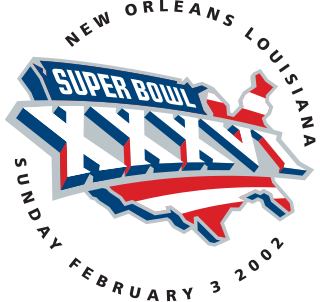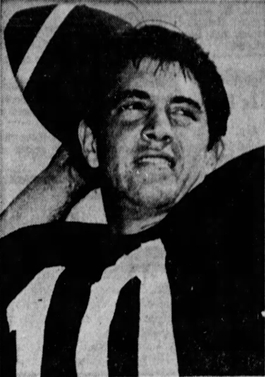Related Research Articles

Super Bowl XXXVI was an American football game between the National Football Conference (NFC) champion St. Louis Rams and the American Football Conference (AFC) champion New England Patriots to decide the National Football League (NFL) champion for the 2001 season. The underdog Patriots defeated the heavily favored Rams by the score of 20–17. It was New England's first Super Bowl championship, and the franchise's first league championship of any kind. The game was also notable for snapping the AFC East's long streak of not being able to win a Super Bowl championship, as the division's teams had lost 7 Super Bowls between the Miami Dolphins' victory in 1974 and the Patriots' 2002 win. This was the last Super Bowl to feature the St. Louis Rams; after relocating to Los Angeles in 2016, the Rams returned to the NFL's championship game in Super Bowl LIII, in which they were again defeated by the Patriots. The Rams would not win another Super Bowl until Super Bowl LVI, as the Los Angeles Rams, defeating the Cincinnati Bengals.
William McDonough was an American sportswriter for The Boston Globe who also worked as an on-air football reporter for CBS and NBC.

John Frederick Dryer is an American actor, radio host, and former professional football player.

This article contains an in-depth explanation of the history of the New England Patriots, a professional American football team that competes in the National Football League (NFL).
Maxie Callaway Baughan Jr. was an American football linebacker who played in the National Football League (NFL) for the Philadelphia Eagles, Los Angeles Rams, and the Washington Redskins. Baughan played college football for the Georgia Tech Yellow Jackets.
The New England Patriots generally run a modified Erhardt-Perkins offensive system and a Fairbanks-Bullough 3–4 defensive system, though they have also used a 4–3 defense and increased their use of the nickel defense.

Edward Gerald Hinton is an American former professional football wide receiver who played for six seasons in the National Football League (NFL). Hinton spent four seasons with the Baltimore Colts, including their 1970 Super Bowl winning season, and one season each with the Houston Oilers and New England Patriots. He played college football at the University of Oklahoma.
Shelby Lewis Jordan was an American professional football player who was an offensive tackle in the National Football League (NFL) for the New England Patriots and the Los Angeles Raiders from 1975 to 1986. He was a member of the 1983 Raiders team that won Super Bowl XVIII.

Patrick Lewis Studstill Jr. was an American professional football player who was a wide receiver, punter and return specialist. He played 12 years in the National Football League (NFL) for the Detroit Lions (1961–1967), Los Angeles Rams (1968–1971), and New England Patriots (1972). He led the NFL with 457 punt return yards in 1962. In 1966, he led the league in both receiving yards (1,266) and punting yards (3,259). He also tied an NFL record in 1966 with a 99-yard touchdown reception.
Robert Edward Windsor is a former tight end in the National Football League (NFL).
Leigh Montville is an American writer and former newspaper columnist who worked for The Boston Globe and Sports Illustrated.
Edward Jay Jenkins is an American lawyer and former American football running back in the National Football League (NFL) for the Miami Dolphins, the Buffalo Bills, the New England Patriots, and the New York Giants. He played college football at the College of the Holy Cross as a wide receiver and running back and was drafted by the Dolphins in the eleventh round of the 1972 NFL draft.
Noel Charles Jenke was an American professional football player who was a linebacker in the National Football League (NFL). He played for three different teams during the 1971 through 1974 seasons. Before playing professional football, Jenke was a minor league baseball player in the Boston Red Sox organization.
The 1974 Boston University Terriers football team represented Boston University as a member of the Yankee Conference during the 1974 NCAA Division II football season. In its second season under head coach Paul Kemp, the team compiled a 5–4–1 record, placed in a four-way tie for third in the Yankee Conference, and outscored opponents by a total of 145 to 129.
The 1968 Rhode Island Rams football team was an American football team that represented the University of Rhode Island as a member of the Yankee Conference during the 1968 NCAA College Division football season. In its fifth season under head coach Jack Zilly, the team compiled a 3–6 record, finished in a three-way tie for third place out of six teams in the Yankee Conference, and was outscored by a total of 168 to 137. The team played its home games at Meade Stadium in Kingston, Rhode Island.
The 1968 Boston University Terriers football team was an American football team that represented Boston University as an independent during the 1968 NCAA College Division football season. In its fifth and final season under head coach Warren Schmakel, the team compiled a 5–3–1 record and was outscored by a total of 125 to 117.
James Charles White was an American football defensive end for the New England Patriots, the Houston Oilers, the Seattle Seahawks, and the Denver Broncos of the National Football League, as well as the BC Lions of the Canadian Football League. He played college football at Colorado State.
Kent Carter is a former American football linebacker who played for the New England Patriots of the National Football League (NFL) and the Ottawa Rough Riders, Edmonton Eskimos, Hamilton Tiger-Cats and Toronto Argonauts of the Canadian Football League (CFL).
William Lee Overmyer is a former American football linebacker.
Lawrence Horton is a former American football defensive end who played for the Chicago Bears of the National Football League (NFL) and the Montreal Alouettes of the Canadian Football League (CFL).
References
- 1 2 "Will Foster". Pro Football Reference. Sports Reference. Retrieved August 30, 2022.
- ↑ "District NAIA eleven announced". Battle Creek Enquirer. November 27, 1970. p. B-3. Retrieved August 31, 2022– via newspapers.com.
- ↑ "Mental Pressure Impresses Overmyer in pro grid bid". News-Messenger. August 3, 1972. p. 19. Retrieved August 30, 2022– via newspapers.com.
- ↑ Shefski, Bill (August 29, 1972). "Bengals leave Eagles with empty feeling". Philadelphia Daily News. p. 68. Retrieved August 30, 2022– via newspapers.com.
- ↑ "Woodeshick, Nance among Eagles' cuts". Standard-Speaker. September 12, 1972. p. 26. Retrieved August 30, 2022– via newspapers.com.
- ↑ "Transactions". Boston Globe. May 24, 1973. p. 82. Retrieved August 30, 2022– via newspapers.com.
- ↑ Monahan, Bob (August 14, 1972). "It's early yet, says Fairbanks of costly Patriots' mistakes". Boston Globe. p. 27. Retrieved August 30, 2022– via newspapers.com.
- ↑ "Transactions". Boston Globe. p. 60. Retrieved August 30, 2022– via newspapers.com.
- ↑ Montville, Leigh (September 24, 1973). "Patriots can't find right key". Boston Globe. p. 21. Retrieved August 30, 2022– via newspapers.com.
- ↑ Harber, Paul (September 24, 1973). "Dawson leads Chiefs past Patriots". Concord Monitor. p. 15. Retrieved August 30, 2022– via newspapers.com.
- ↑ Montville, Leigh (September 24, 1973). "Dawson to Taylor—and old story, but still a good one". Boston Globe. p. 22. Retrieved August 30, 2022– via newspapers.com.
- 1 2 3 "Will Foster Game Logs". Pro Football Reference. Sports Reference. Retrieved August 30, 2022.
- ↑ Rowe, Bob (October 15, 1973). "Jets' plan was perfect". The Record. p. 23. Retrieved August 30, 2022– via newspapers.com.
- ↑ O'Hara, Dave (November 19, 1973). "NE Patriots jolt Green Bay, 32-24". Lewiston Daily Sun. p. 31. Retrieved August 30, 2022– via newspapers.com.
- ↑ "Patriots get new linebacker". Cincinnati Post. November 22, 1973. p. 62. Retrieved August 30, 2022– via newspapers.com.
- ↑ Montville, Leigh (September 29, 1974). "Patriots winning by stopping the run". Boston Globe. p. 66. Retrieved August 31, 2022– via newspapers.com.
- 1 2 McDonough, Will (October 26, 1974). "'Unhappy' Foster walks out of Patriots' camp". Boston Globe. p. 21. Retrieved August 31, 2022– via newspapers.com.
- ↑ Montville, Leigh (September 30, 1974). "OK, you Pats, I do believe". Boston Globe. p. 21. Retrieved August 31, 2022– via newspapers.com.
- ↑ McDonough, Will (October 29, 1974). "25 Patriots banged up, but Bills hurting, too". Boston Globe. p. 26. Retrieved August 31, 2022– via newspapers.com.
- ↑ McDonough, Will (November 13, 1974). "Rozelle rejects plea by Sullivan". Boston Globe. p. 63. Retrieved August 31, 2022– via newspapers.com.
- ↑ "Patriots cut six". Greenfield Recorder. April 18, 1975. p. 15. Retrieved August 31, 2022– via newspapers.com.